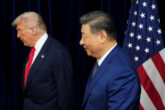October 08, 2024
What Can the US Expect From Sri Lanka’s New President?
Sri Lanka begins a new political era under the presidency of Anura Kumara Dissanayake, who was elected in September following an economic crisis in 2022 that brought down the previous government and sparked political uncertainty in the country for the last two years.
There are several questions about Dissanayake and his National People’s Party (NPP), a leftist party that in the past has had strained relations with India and the West. These concerns are amplified by the current geopolitics in the Indian Ocean and the complicated triangular relationships between the United States, India, and China, and their respective relations with Sri Lanka.
Washington views Sri Lanka as a “lynchpin” of its Indo-Pacific strategy and seeks a partner committed to strengthening the democratic process and economic governance while protecting its sovereignty from malign regional actors.
Defined in the State Department’s Integrated Country Strategy as the “fulcrum” of the Indo-Pacific, Sri Lanka is crucial for promoting Washington’s broader regional policy. Concerns about China’s economic and potential military engagement with Sri Lanka and the Indian Ocean region will continue to drive U.S. interests in maintaining relations with the island nation. Washington views Sri Lanka as a “lynchpin” of its Indo-Pacific strategy and seeks a partner committed to strengthening the democratic process and economic governance while protecting its sovereignty from malign regional actors.
In his speech after swearing in as president, Dissanayake articulated Sri Lanka’s aim to “work with the world” in its foreign relations, regardless of geopolitical fractures, to serve the nation’s interests. This reflects a dynamic in Sri Lanka’s foreign policy aimed toward pragmatic multi-alignment that primarily serves the nation’s acute domestic economic needs. However, Dissanayake’s campaign and the NPP manifesto also stress promoting Sri Lanka’s sovereignty and territorial integrity “without compromise,” suggesting that the new government’s foreign policy will also be guided by perceived threats to these core principles.
Read the full article from The Diplomat.
More from CNAS
-
Chinese Maker of Bitcoin-Mining Machines Is a Security Threat, Says Expert
Bloomberg News reports that a Chinese manufacturer, Bitmain Technologies Ltd, that sells most of the world’s Bitcoin-mining machines — including 16,000 of them to a venture ba...
By David Feith
-
Indo-Pacific Security / Energy, Economics & Security
North Korea’s Provocations, Power Plays, and Shifting AlliancesTensions on the Korean Peninsula have reached a new and dangerous threshold. President Lee Jae Myung is warning of a real risk of accidental military clashes, as the situation...
By Dr. Go Myong-Hyun
-
Indo-Pacific Security / Energy, Economics & Security
How to Win the Economic War with ChinaTrump's approach to China has run aground, giving Beijing unprecedented advantage in the economic conflict....
By Edward Fishman & Julian Gewirtz
-
Indo-Pacific Security / Technology & National Security
Sharper: Tech + ChinaRecent talks between President Donald Trump and Chinese Communist Party General Secretary Xi Jinping placed a spotlight on emerging technologies, from high-end chips to minera...
By Charles Horn & Sevi Silvia




